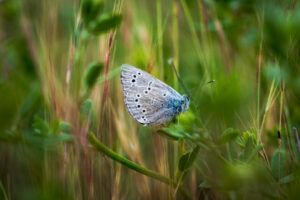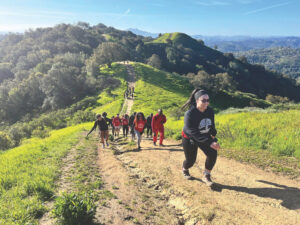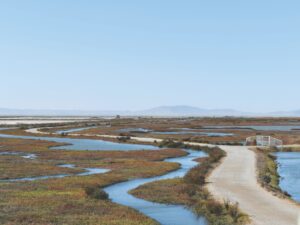You might remember the guy. A year ago at this time, Alden Olmsted was on a mission. Seventy California state parks were slated for closure, and like many parks advocates he sprang to action — but he took it grassroots, one dollar at a time.
At his peak, the filmmaker’s “bucket list” amounted to 63 plastic donation buckets placed in cafes near state parks throughout central and northern California. Just give a dollar, the signs on his buckets asked, to save the parks from a devastating $22 million in state budget cuts.
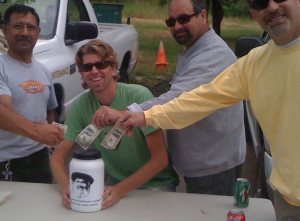
Nonprofits and local businesses embraced his grassroots campaign, and his effort netted $38,000. But then Olmsted heard the news: The California Department of Parks and Recreation had been sitting on a hidden surplus of $54 million.
Olmsted pulled his buckets.
“I can’t in good conscience ask the public for $1 when the state has an extra $54 million,” he said.
He was like many angry parks advocates, but rather than throw his hands in the air, he kept on. The reason why you haven’t heard from him in awhile is because he’s been a bit underground. Nowadays he’s using his filmmaking to convince the public of the importance of their parks by sharing the story of Jug Handle State Natural Reserve on the Mendocino coast. He plans to complete the final editing of the film within the next month.
Olmsted, 41, grew up exploring the woods of Jug Handle from his family’s nearby home on the Mendocino coast. His father, John Olmsted, was a botanist and an educator who acquired and protected the site that is now Jug Handle after halting development there in the late 1960s. Each park has a story behind it.
“The point is that it’s a microcosm of all of our parks,” the younger Olmsted said. “How many other stories are there out there that we don’t know? We usually just go to a park, pull off to the side of the road and take a picture and that’s it.”
The film comes as a follow up to Olmsted’s documentary piece “My Father Who Art in Nature,” which he showed to his father five days before his death at age 73 in March 2011.
The elder Olmsted – a distant cousin of the famed landscape architect Frederick Law Olmsted — was an educator at Golden Gate Park, the Oakland Museum and UC Berkeley Extension. He helped to build the Independence Trail, a wheelchair accessible path in the Yuba River Canyon, and founded the nonprofit conservation groups California Institute of Man in Nature and the Sequoya Challenge.
“John [Olmsted] was a real visionary and his vision was bigger than his lifetime, so it’s cool to see his son continuing on this path,” said Laura Brown, outreach coordinator for the Bear Yuba Land Trust, who has worked with both father and son. “In a lot of ways he’s helped keep the story of his dad alive through the work that he’s doing.”
The younger Olmsted said father’s early efforts at Jug Handle were the moments that whetted his appetite for conservation work.
“When my dad left Mendocino, that was 30 years ago,” he said. “So people have no idea the drama that went into saving Jug Handle. They don’t know John Olmsted from anyone and they don’t know how much it took.”
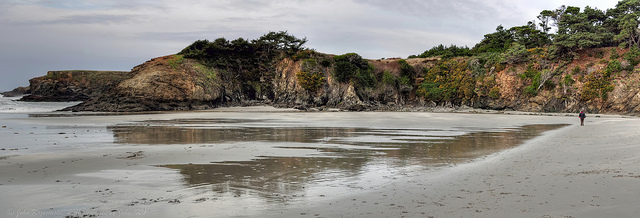
Alden Olmsted – who studied business and graphic design at Biola University in Los Angeles and opened a BMX bike company after college — said he never intended to be like his father, who patterned his life after environmentalist John Muir. But the younger Olmsted believes there must be something in his genes that drives him to conservation and activism.
He even dabbled in politics in November when he became a write-in candidate for the Cotati City Council, supporting a ban on roundabouts in the city. Although the measure to block the roundabouts passed, Olmsted didn’t win the election.
He now divides his time between Los Angeles and Petaluma as he finishes up his film and makes greeting cards and hand-drawn maps of California. Olmsted said the parks will remain a pressing concern to him because the state is mismanaging the lands that his father fought to protect.
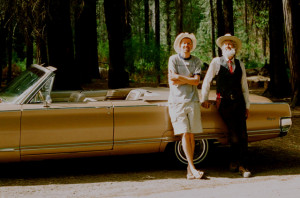
Since the parks funding scandal, the state has replaced its top parks department staff and a bill has recently passed through an Assembly committee to provide more oversight over state agencies’ financial reports. Gov. Jerry Brown also signed a law in September allocating $10 million in grants to the state park system and postponing the closures until July 2014.
But Olmsted said the state still needs to take the situation more seriously. Last week he sent a letter to the governor expressing his disappointment about the scandal over the hidden money and accused the the state of using natural spaces as a pawn in a political battle. Momentum has been building to rethink the model of a centralized State Parks Department, and instead transfer responsibility to local groups who would handle operations and fundraising. But despite his criticisms of the parks department, Olmsted still thinks it is the one who should remain in charge — albeit doing a better job at it.
“The drama involving state parks needs to end,” Olmsted wrote to Brown. “They need to be hereby removed from the ups and downs of politics permanently, regarded as not expendable, but necessary to our lives, because they are.”
What ever happened to Alden Olmsted is a part of a Bay Nature series on the state parks funding crisis. Dhyana Levey is a contributor to the series.


